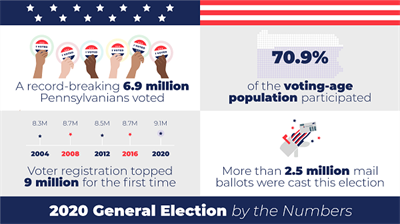D Is for Dysfunction in 2020 Election
Like all things this year, the 2020 general election season has been chaotic. With the coronavirus pandemic, the long delay in counting millions of mail-in ballots, and the poor showing of pollsters once again, some might think the D in democracy is better suited for dysfunction.

 By Alex Fabian, PICPA government relations manager, and Peter Calcara, PICPA vice president - government relations
By Alex Fabian, PICPA government relations manager, and Peter Calcara, PICPA vice president - government relations
Like all things this year, the 2020 general election season has been chaotic. With the coronavirus pandemic, the long delay in counting millions of mail-in ballots, and the poor showing of pollsters once again, some might think the D in democracy is better suited for dysfunction. The 2020 presidential election marked the first time Pennsylvanians could vote by mail (beyond absentee ballots). Nearly 3 million mail-in ballots were cast in Pennsylvania. The legislature’s refusal to allow the count to commence prior to election day was just one of the factors that morphed “election day” into “election month.”
This year roughly 6.9 million of Pennsylvania’s more than 9 million registered voters cast a ballot. Nationwide, a record breaking 161 million Americans, an estimated 66.8% of registered voters, cast their ballot to elect a president.
 |
|
Source: Pennsylvania Gov. Tom Wolf, Facebook |
An expected “blue wave” never materialized, either here in Pennsylvania or nationwide. While now President-Elect Joe Biden won the national popular vote and Pennsylvania’s 20 electoral votes, down-ballot Republicans did much better than anticipated. Biden tallied nearly 3.4 million votes compared to Trump’s 3.3 million in Pennsylvania.
All 18 members of Pennsylvania’s delegation to Congress will be returning to Washington, D.C., in January, including CPA Rep. Brian Fitzpatrick (R-Bucks), who defeated Democratic challenger Christina Finello. The breakdown of the delegation continues to be nine Democrats and nine Republicans.
Republicans in the Pennsylvania House and Senate had a good election night. Most of the state House and Senate seats held by Republicans in the southeast corner of the state, long thought to be vulnerable, were reelected. GOP leaders in the General Assembly will be returning for the 2021-2022 session in January with slightly larger majorities in both the House and Senate. Before the election, House Republicans held a 109-93 majority (with one vacancy). In the 50-member state Senate, Republicans currently hold a 29-21 (with one independent who caucuses with the GOP) majority.
CPA-PAC, the political arm of the PICPA, is pleased to report that five current or former CPAs – Rep. Mike Peifer (R-Pike), Rep. George Dunbar (R-Westmoreland), Rep. Keith Greiner (R-Lancaster), Rep. Frank Ryan (R-Lebanon), and Rep. Ben Sanchez (D-Montgomery) – will all be returning to Harrisburg next year. In addition, CPA Nick Pisciottano (D-Allegheny) will be joining the group in January. Sen. Pat Browne, CPA (R-Lehigh), was not on the ballot this year.
In the election for Pennsylvania’s row offices, Republicans flipped two seats. Democrat Josh Shapiro was reelected for another term as attorney general. Republican Tim DeFoor defeated Democrat Nina Ahmad for the open auditor general office, and in an upset, election newcomer Stacy Garrity (R) defeated Democrat incumbent state Treasurer Joe Torsella. Garrity, a military veteran, has never held public office.
The CPA-PAC plays a critical role in providing support for the election of candidates for statewide office in the following categories: state House, state Senate, governor, attorney general, auditor general, and state Supreme Court justices. The CPA-PAC may also disburse funds to caucus committees, political party committees, and state organizations that may support PICPA’s legislative priorities.
This year, $164,550 was disbursed to support the campaigns of candidates who endorse positions favorable to PICPA members. Contribution requests are considered on a case-by-case basis and addressed in a bipartisan manner. To put things in perspective, the CPA-PAC spent about $2,400 less this year than last year – a low profile election year – and we were either on or under budget for every category in which funds were allocated, resulting in disbursements coming in significantly lower than anticipated. This is largely due to the coronavirus pandemic and an unforeseen halt in fundraising events.
One hundred candidates for the state legislature were supported by the CPA-PAC in 2020. Disbursements were also made to the ChamberPAC and campaign finance committees for both parties. Of the candidates supported, 81 won, 6 lost, and 12 were not up for reelection in 2020.
Many factors made this election atypical, but the CPA-PAC upheld its proven track record of supporting strong candidates. As for this year’s dysfunction, we are very much hoping it does not become the “new normal,” and we are looking ahead to the 2021-2022 legislative session, where things will hopefully feel a bit more familiar.
As always, contributions to the CPA-PAC are greatly appreciated.
PICPA Staff Contributors
Disclaimer
Statements of fact and opinion are the authors’ responsibility alone and do not imply an opinion on the part of PICPA officers or members. The information contained in herein does not constitute accounting, legal, or professional advice. For professional advice, please engage or consult a qualified professional.






